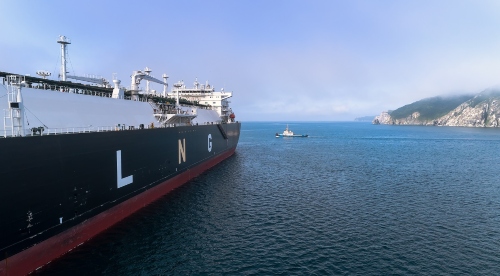(Bloomberg) – Nigeria’s UTM Offshore Ltd. has received approval to build the West African nation’s first-ever floating liquefied natural gas (LNG) facility — five years after it was first announced.
The Nigerian Midstream and Downstream Petroleum Regulatory Authority issued a so-called license-to-construct to the Abuja-based company for an LNG project estimated at 2.8 million metric tons per year.
“This marks a significant milestone and aligns with the gas expansion ambitions of the government,” Farouk Ahmed, head of the regulatory agency, said on Friday.
Nigeria, Africa’s largest crude producer, is trying to pivot away from its reliance on oil by promoting investment in the country’s largely unexploited 200 Tcf of proven gas reserves. Most of the nation’s gas output is currently either flared or re-injected into wells.
UTM was initially granted a license to build a 1.2 MMtpa facility in 2019, but it was upgraded to 2.8 million tons “because of increased LNG demand in the market,” Ahmed said.
2028 commissioning. The plant, located in offshore Akwa Ibom state in the oil-rich Niger Delta, is expected to be commissioned in 2028, with first gas a year later. It will produce LNG, petroleum gas and condensate.
The company had signed a memorandum of understanding with the African Export-Import Bank in 2021 to raise as much as $2 billion for the project, and the bank has received a first-level approval to invest $350 million in the project, said UTM Chief Executive Officer Julius Rone. A final investment decision is expected in the last quarter of the year, he said.
The company had also concluded contracts with Japan’s JGC Corp. and Houston-based KBR Inc. to design the project, with Vitol Group having an off-take agreement for LNG produced at the facility. Last year, the company signed a deal that saw state-owned Nigerian National Petroleum Co. Ltd. take a 20% stake in the project.
UTM had proposed getting feedstock for the project at an offshore oil field that’s operated by Exxon Mobil Corp. in partnership with the NNPC, but that asset is in the process of being sold to Seplat, which has ambitions of its own to develop its vast gas reserves. Rone said talks are progressing with to participate in the midstream arm of the project.
Seplat didn’t immediately respond to a request for comment.
“It is a stranded gas that can only be monetized through a floating LNG technology. It will only add to Seplat’s balance sheet to say they have a ready-made buyer for a gas they have not developed,” he said.

